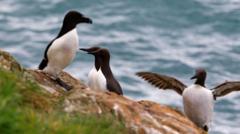Is Bird Flu in Seabirds a Threat? Stay Vigilant!

Understanding Bird Flu: Risks, Precautions, and What You Need to Know
Recently, a warning was issued in Ceredigion, Wales, regarding the detection of bird flu in seabirds along its coastline. This incident has raised awareness about the potential risks associated with avian influenza, prompting local authorities to advise residents and visitors to remain vigilant. This article will delve into the nature of bird flu, its implications for public health, and the necessary precautions to ensure safety amidst this situation.
The Emergence of Bird Flu in Wales
In the past month, Ceredigion council reported confirmed cases of avian influenza in wild seabirds, specifically a guillemot found deceased on New Quay beach. This notification comes after the first Welsh cases of bird flu in poultry in three years were discovered in Pembrokeshire and Wrexham, resulting in protection zones being established to mitigate the spread.
In light of these developments, residents are advised to exercise caution, particularly along the stretch of coastline between Aberaeron and New Quay. The council plans to install advisory signage at critical beach access points to educate the public about the risks and necessary safety measures.
What is Bird Flu?
Bird flu, or avian influenza, is a viral infection that primarily affects birds. It is caused by influenza viruses that are typically found in wild birds, especially waterfowl, such as ducks and geese. While there are many strains of bird flu, the ones most concerning to public health authorities are those that can infect humans and cause significant illness.
Transmission of bird flu can occur through:
- Close contact with infected birds, both dead and alive.
- Exposure to contaminated environments, including droppings, feathers, and nesting areas.
- Consumption of undercooked poultry or eggs from infected birds.
Public Health Risks
While the risk of bird flu to public health is considered low, vigilance is essential, especially for those living in or visiting affected areas. Matthew Vaux, Ceredigion's cabinet member for public protection, emphasized the importance of remaining cautious and not handling any dead birds. Although avian influenza is primarily a concern for birds, certain strains can, in rare cases, infect humans, leading to serious health complications.
Precautions to Take
To mitigate the risks associated with bird flu, local authorities have outlined several precautions for residents and visitors:
- Avoid Contact: Do not touch or pick up dead or visibly sick wild birds.
- Keep Pets Leashed: Ensure dogs are kept on leads and adhere to designated footpaths, particularly in areas where wild birds are present.
- Safe Practices: Avoid contact with bird feathers or droppings whenever possible.
- Wash Hands: After handling poultry or other birds, thoroughly wash your hands with warm water and soap.
Additionally, the public is encouraged to report sightings of dead wild waterfowl, such as swans, geese, and ducks, or other wild birds like gulls or birds of prey to the Department for Environment, Food and Rural Affairs (Defra).
Food Safety Guidelines
In the context of bird flu, food safety is paramount, especially when handling poultry. Here are some essential guidelines to follow:
- Separate Utensils: Use different utensils for handling cooked and raw meat to prevent cross-contamination.
- Cook Thoroughly: Ensure that poultry and eggs are cooked until steaming hot; this will kill any potential viruses present in the meat.
- Practice Hygiene: Wash hands frequently with soap and water, especially before and after handling food, and particularly raw poultry.
Understanding the Symptoms of Bird Flu
Recognizing the symptoms of bird flu in birds can help in early detection and prevention of further spread. Here are some common signs observed in infected birds:
- Sudden death without signs of illness.
- Neurological signs such as tremors or twisted necks.
- Decreased activity or lethargy.
- Respiratory distress, including coughing or sneezing.
- Swelling around the head, neck, and eyes.
If you observe any of these symptoms in birds, it is crucial to report them to local authorities immediately.
The Role of Authorities in Managing Bird Flu
In response to the recent detection of bird flu, local councils and public health authorities have taken proactive measures to manage the situation. These include:
- Establishing protection zones around confirmed cases to prevent the spread of the virus.
- Installing signage to inform the public about safety precautions.
- Conducting surveillance and monitoring of bird populations to track the spread of the virus.
- Providing guidance and support to poultry farmers to safeguard their livestock.
What You Can Do
As a member of the public, you play a crucial role in preventing the spread of bird flu. Here are steps you can take:
- Stay Informed: Keep up to date with the latest guidelines from local authorities and health organizations regarding bird flu.
- Educate Others: Share information with friends and family about the risks associated with bird flu and the precautions to take.
- Report Cases: If you encounter dead wild birds or observe signs of illness in birds, report them promptly to the relevant authorities.
FAQs
What are the symptoms of bird flu in humans?
Symptoms of bird flu in humans can vary but may include fever, cough, sore throat, shortness of breath, and muscle aches. Severe cases can lead to pneumonia and even death.
Is bird flu contagious to humans?
Bird flu is not easily transmitted to humans. Infection usually occurs through close contact with infected birds or contaminated environments. However, it is essential to remain cautious.
What should I do if I find a dead bird?
If you find a dead bird, do not touch it. Report the sighting to your local wildlife authority or the Department for Environment, Food and Rural Affairs (Defra) to ensure it is handled safely.
Can I eat chicken or eggs during a bird flu outbreak?
Yes, you can safely eat poultry and eggs if they are properly cooked. Ensure that they reach an internal temperature of 165°F (75°C) to kill any potential viruses.
How can I protect my pets from bird flu?
Keep pets, especially dogs, on leashes when in areas where wild birds are present. Prevent them from interacting with or consuming dead birds or bird droppings.
Conclusion
The recent warning in Ceredigion serves as a critical reminder of the importance of vigilance concerning bird flu. While the risk to public health remains low, being informed and adhering to safety precautions is paramount. By staying educated and proactive, we can help mitigate the risks and protect both ourselves and our communities from potential outbreaks.
As we navigate through these challenges, consider what steps you can take to ensure your safety and the safety of others. Are you prepared to act if you encounter sick or dead birds? Your awareness and actions can make a difference.
#BirdFlu #PublicHealth #StayVigilant
Published: 2025-07-10 16:05:14 | Category: wales



